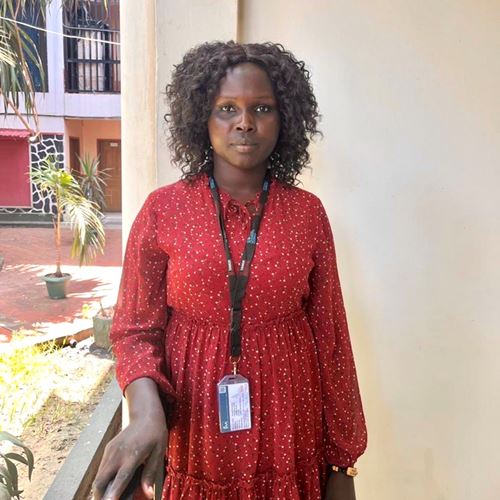How did you become involved in the field of protection?
My initial dream was to become a medical doctor, caring for people and treating various ailments.
Although I couldn't fulfill that dream, it didn't deter me from helping those in need. It led me to the field of protection, where I find immense joy in serving the most vulnerable individuals, saving lives, and advocating for their rights.
As a woman, witnessing the mistreatment of other women and girls in my community and across the nation, this drives a force in me to work hard to prevent and respond to Gender-Based Violence (GBV).
I am supporting, empowering, and encouraging women to break their silence and speak out against any form of GBV in their communities.
The theme emphasizes collective efforts to challenge harmful beliefs and attitudes and prevent GBV against women and girls.
As a Protection Officer, my main objective is to prevent all forms of GBV and respond when it occurs specifically to the most vulnerable individuals.
The theme emphasizes collective efforts to challenge harmful beliefs and attitudes and prevent GBV against women and girls.
As a Protection Officer, my main objective is to prevent all forms of GBV and respond when it occurs specifically to the most vulnerable individuals.
The theme aligns with my work by encouraging the development and implementation of training programs, conducting awareness campaigns, and initiatives like "Girl Shine."
These initiatives are designed to reshape negative societal perfections about women and girls, revitalizing their self-esteem that has long been obscured within our communities.
Could you share some of the key initiatives or projects you're involved in to prevent violence against women and girls?
I’ve been involved in the process of establishment of several Women and Girls Friendly Spaces by DRC within the country. These spaces serve as hubs for both response and prevention, offering vital services such as psychosocial support, life skills training, referrals, and case management.
I feel the impact has been profound. Women and girls using these spaces have experienced increased self-esteem, resilience, and expanded social networks.
They have become empowered to discuss their experiences, support one another, and courageously report instances of violence without hesitation or shame – a transformative shift that was not prevalent in the past.
What are the primary challenges and obstacles to preventing violence against women and girls?
In South Sudan, negative social norms such as cultural practices, gender inequality, limited access to education, early child marriage among others, make it difficult to prevent violence against women and girls.
As a Protection Officer, I train local authorities and community leaders both male and female on issues surrounding GBV such as, prevalence and impacts, root causes, forms of GVB among others.
Community dialogues that target influential figures within the community play a pivotal role in reshaping perceptions and reducing GBV rates.
As an advocate for this cause, what message or advice would you like to convey to the public, decision-makers, and individuals about the importance of investing in the prevention of violence against women and girls?
I'd like to emphasize that women have the ability to contribute just as much as men.
The key to reducing the risk of violence is treating everyone equally, without discrimination.
It's important for all of us to unite and collaborate in order to eradicate this threat.
What measures can we take to prevent violence in our communities?
Like this year’s theme suggests, it is the collective responsibility for us all to end violence against women and girls.
Simultaneously, there is a need to establish safer communities for everyone.
Violence often starts at home, where harmful concepts and social norms are instilled in the minds of both girls and boys, perpetuating negative attitudes.
We can all contribute by respecting and treating all individuals equally, without favoritism or discrimination, thus reducing the risk of violence. Together, we can make a difference.
Thank you, Monica for your dedication to ending violence against women and girls.
